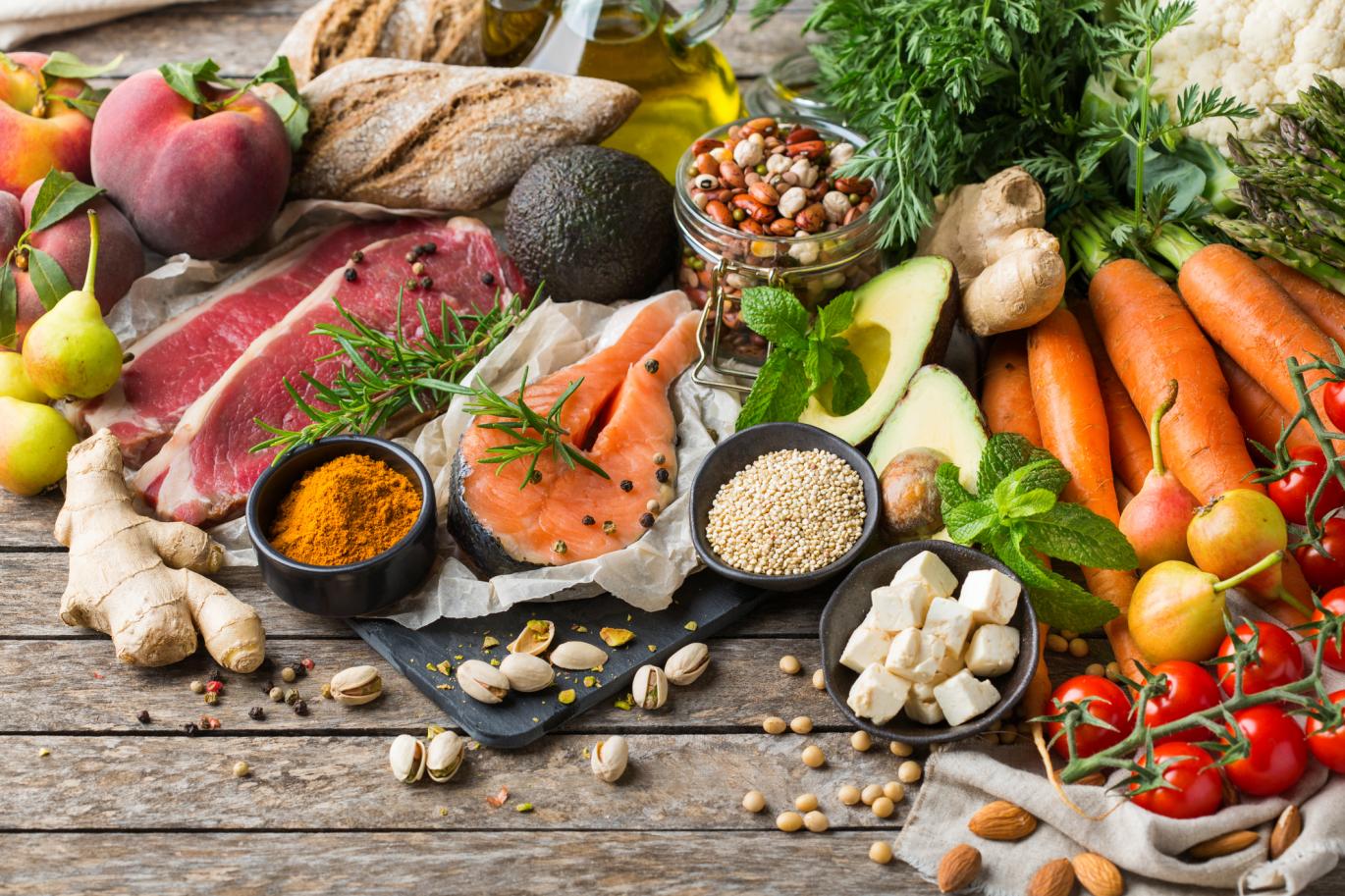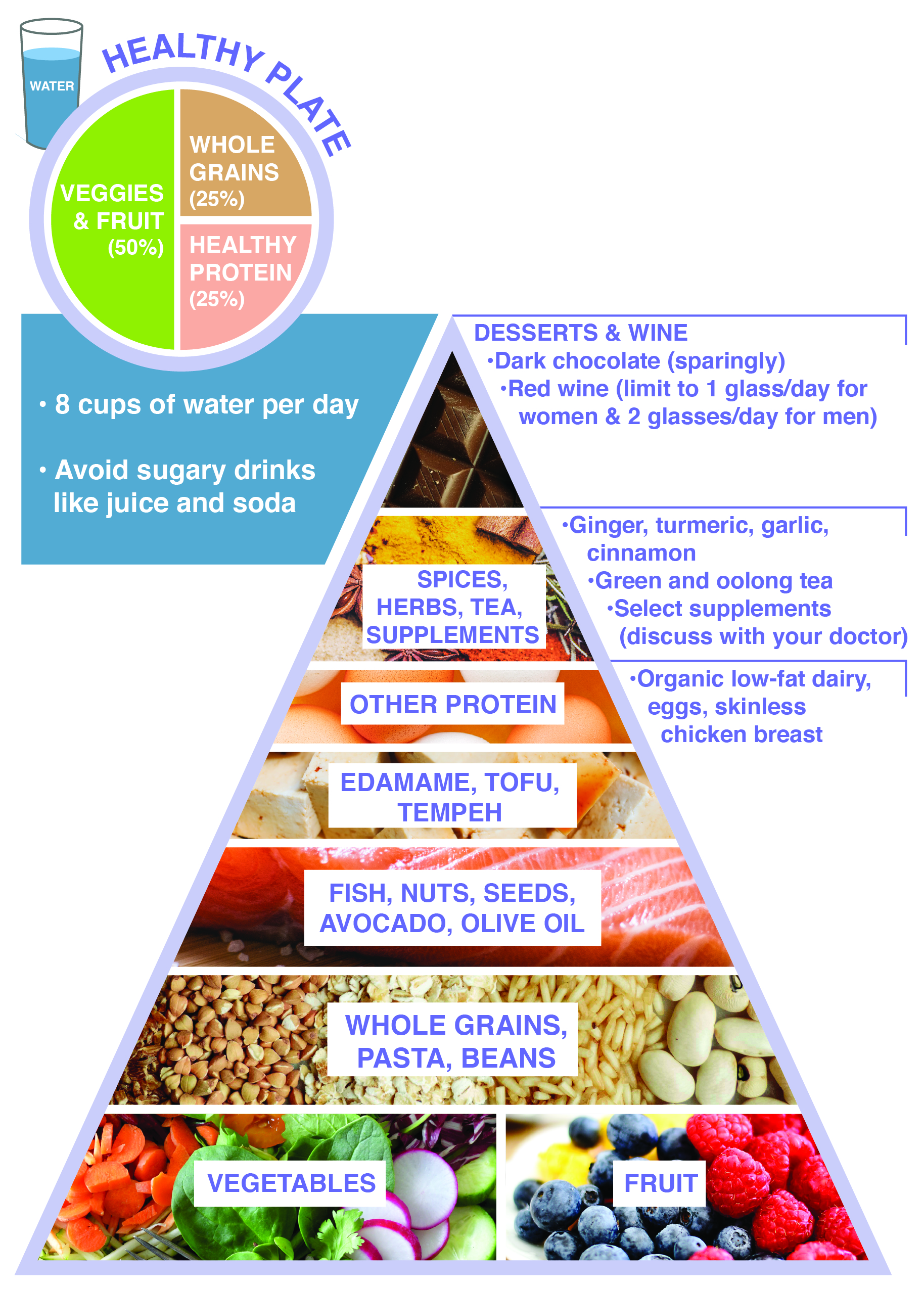General Nutrition Recommendations
Nutrition for People with Rheumatic Diseases
Though this material was generated for people with rheumatic conditions as part of Nutrition for People with Rheumatic Diseases, it is also relevant to the general public and those looking for an example of an anti-inflammatory diet.
Cover at least half your plate with an abundance of non-starchy vegetables and fruits from the entire color spectrum.
-
 Vegetables and fruits have high concentrations of polyphenols (antioxidants), carotenoids (antioxidants), and fiber.
Vegetables and fruits have high concentrations of polyphenols (antioxidants), carotenoids (antioxidants), and fiber. -
Examples of highly nutritious vegetables: Lightly cooked dark leafy greens (spinach, collard greens, kale, and swiss chard), cruciferous vegetables (broccoli, cabbage, brussels sprouts, kale, bok choy, and cauliflower), carrots, beets, onions, peas, squashes, sea vegetables, and washed raw salad greens.
-
Examples of highly nutritious fruits: Raspberries, blueberries, strawberries, peaches, nectarines, oranges, pink grapefruit, plums, pomegranates, blackberries, cherries, apples, and pears. These are better than tropical fruits, which carry a higher glycemic load.
Choose low glycemic index carbohydrates rather than high-glycemic index foods, and whole grains rather than refined grains.
-
Eating low glycemic rather than high glycemic carbohydrates gives your body steady energy and smaller spikes in blood sugar levels.
-
Eat whole grains—grains that are intact or in a few large pieces—such as brown rice, basmati rice, wild rice, barley, quinoa, and steel-cut oats.
-
Limit carbohydrates from products made of flour.
Eat healthy fats that are rich in monounsaturated and/or omega-3 polyunsaturated fatty acids.
-
Omega-3 fatty acids, commonly called “omega-3s”, have a number of anti-inflammatory properties [1]. Humans cannot make omega-3 fatty acids in the body, so they need to come from the diet. Fatty fish (for example, sardines, salmon, herring, and black cod), seeds (including hemp, chia, flaxseed oil, and freshly ground flaxseed), and nuts (especially walnuts) are important sources of omega-3 fatty acids.
-
Use extra virgin olive oil (high in monounsaturated fatty acids and polyphenols) in cooking, food preparation, and salad dressings.
-
Other sources of healthy fat include avocados, omega-3 enriched eggs, and whole-soy foods (tofu, tempeh, edamame).
Choose plant-based protein and limit red meat.
-
People who eat a mostly vegetarian diet live longer and vegetarian diets have been associated with less symptoms in several inflammatory conditions, such as rheumatoid arthritis [2, 3].
-
Examples of vegetarian protein include beans, legumes, nuts, and whole soy foods (tofu, tempeh, edamame).
-
Fish is also a healthy source of protein and healthy fats (see above).
Season your food with anti-inflammatory spices.
-
Turmeric (Curcuma longa) is a medicinal plant with a long history of usage in indigenous South Asian cultures and Ayurvedic medicine. The rhizome (rootstock) of turmeric contains curcumin, a bright yellow chemical with anti-inflammatory properties [4-6]. Turmeric is traditionally used as a spice in food preparation, an ingredient in topical applications, and as an extraction made with water, milk, or ghee.
-
Ginger root is another plant commonly used in South Asian cooking that is known to have anti-inflammatory and anti-oxidative effects [7, 8]. It has traditionally been used as an herbal supplement for the treatment of many chronic ailments, including asthma and arthritis. A study that looked at how ginger may be helpful for people with lupus found that one of its compounds—called 6-gingerol—helps to decrease the release of inflammatory substances from neutrophils, a type of blood cell [9].
Foods to limit and avoid
-
Avoid any food containing hydrogenated or partially hydrogenated oils as ingredients.
-
Avoid processed flour, added sugar, foods containing high fructose corn syrup, and high-fructose juices.
-
Avoid or minimize red meat. Avoid all processed meat.
-
Avoid unhealthy oils including corn, safflower, and sunflower oils.
References
1. Lorente-Cebrian, S., et al., An update on the role of omega-3 fatty acids on inflammatory and degenerative diseases. J Physiol Biochem, 2015. 71(2): p. 341-9.
2. Hafstrom, I., et al., A vegan diet free of gluten improves the signs and symptoms of rheumatoid arthritis: the effects on arthritis correlate with a reduction in antibodies to food antigens. Rheumatology (Oxford), 2001. 40(10): p. 1175-9.
3. Kjeldsen-Kragh, J., et al., Controlled trial of fasting and one-year vegetarian diet in rheumatoid arthritis. Lancet, 1991. 338(8772): p. 899-902.
4. Amalraj, A., et al., A Novel Highly Bioavailable Curcumin Formulation Improves Symptoms and Diagnostic Indicators in Rheumatoid Arthritis Patients: A Randomized, Double-Blind, Placebo-Controlled, Two-Dose, Three-Arm, and Parallel-Group Study. J Med Food, 2017. 20(10): p. 1022-1030.
5. Chandran, B. and A. Goel, A randomized, pilot study to assess the efficacy and safety of curcumin in patients with active rheumatoid arthritis. Phytother Res, 2012. 26(11): p. 1719-25.
6. Tasneem, S., et al., Molecular pharmacology of inflammation: Medicinal plants as anti-inflammatory agents. Pharmacol Res, 2019. 139: p. 126-140.
7. Grzanna, R., L. Lindmark, and C.G. Frondoza, Ginger--an herbal medicinal product with broad anti-inflammatory actions. J Med Food, 2005. 8(2): p. 125-32.
8. Mashhadi, N.S., et al., Anti-oxidative and anti-inflammatory effects of ginger in health and physical activity: review of current evidence. Int J Prev Med, 2013. 4(Suppl 1): p. S36-42.
9. Ali, R.A., et al., Antineutrophil properties of natural gingerols in models of lupus. JCI Insight, 2021. 6(3).


